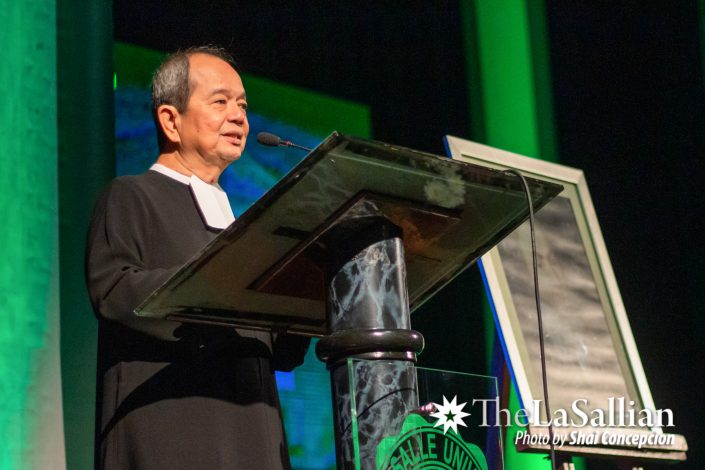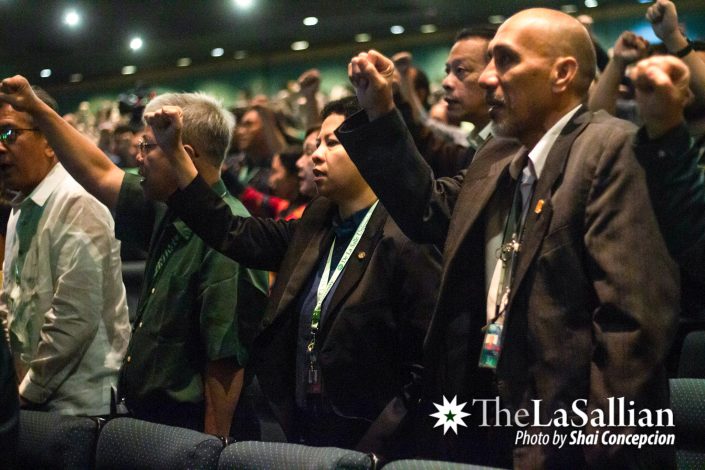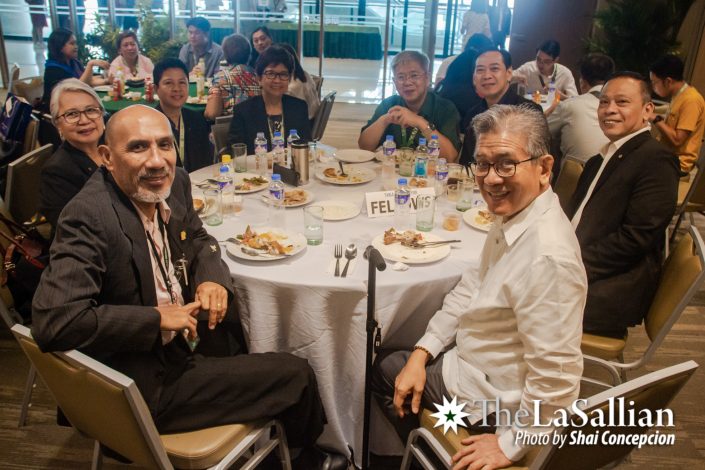DLSU President Br. Raymundo Suplido FSC bared plans to “transform education and human formation,” in the University General Assembly held at the Teresa Yuchengco Auditorium last September 20, with administrators, faculty, and staff in attendance to hear the strategic plans for Academic Year (AY) 2019-2020.
Life-long learning
In his address, Suplido acknowledged the effect of rapid developments in technology that caused the “radical reconfiguration of work”. This, the President asserted, shaped new objectives for the University as it steps forward into another AY.
Among the goals stressed was the need to create opportunities conducive for life-long learning. He stated, “The disruptions that will impact [the] industry and [the] academe require learners with skills and attitudes that will enable them to respond to continuing changes in work, lifestyle, and culture.” Suplido added that students must be creative and adaptable to be able to continuously renew their skill sets.

He continued that life-long learning aims to produce individuals who are attuned to transformational knowledge, such that “education becomes less of a linear process and more of a modular and continuous cycle.” The contribution of continuity will allow individuals to address immediate problems and offer participation to continuous and vocational developments.
Implemented initiatives
Suplido also acknowledged the response and progress toward achieving life-long learning. The successful use of AnimoSpace among students and faculty enabled them to not only address academic matters, but also to develop new modes of engagement.
He also mentioned the constant creation and delivery of interdisciplinary courses through minor and major offerings. Diverse service-learning modules were also credited as these are able to reach out to different partner communities. “I believe this is the right way to go,” Suplido expressed.

In line with this, the role of teachers was addressed by Suplido—saying that as educators, they have to pave way for their students. “As a University, we are front liners in this topic, and there will be no greater example to our students as our own ability to unlearn [old skills] and to relearn [new skills],” he shared.
‘Digital university’
Suplido, however, noted, that DLSU, too had to undergo its own form of life-long learning. This idea, he said, prompted a review of institutional processes, upon which the Board of Trustees approved the conduct of enterprise resource planning in connection with DLSU’s digital transformation.
He explained that the plan—which aimed to rationalize and improve access to information, streamline processes, and enhance services—was part of the University’s response to changing needs through a venture dubbed the Banner Initiative to Transform, Unify, Integrate, and Navigate, also known as the BITUIN project.
A video presented to the audience depicted BITUIN as DLSU’s initiative to turn the institution into a digital university.

College general assemblies
After the main program, the attendees engaged in breakout sessions with their respective colleges for their own general assemblies. The majority of the colleges welcomed new faculty and discussed their strategic plans for the upcoming school year.
College of Computer Studies (CCS) Dean Dr. Rafael Cabrero introduced the new major and minor programs offered for CCS. Goals and objectives were discussed among the faculty, some pertaining to the new curriculum specifics such as the Global Enrichment Term and minor programs. The integration of interdisciplinary research was also mentioned by Cabrero, offering plans on how to capture the engagement of students.
Meanwhile, Dr. Jazmin Llana, Dean of the College of Liberal Arts (CLA), greeted the new faculty in the CLA meeting. The new staff for the Bienvenido N. Santos Creative Writing Center—dedicated to creative writing and research—was also recognized, with Dr. Ronald Baytan from the Literature department as the director.
Leading the College of Science (COS) assembly was College Dean Dr. Glenn Alea, who presented the achievements of the COS faculty and the status of research and publications for each of the Science departments.
On the other hand, Br. Andrew Gonzalez College of Education (BAGCED) Dean Dr. Raymund Sison headed the session for BAGCED. He focused on plans of improvement within his college.
All colleges developed their strategic plans for AY 2019-2020 in alignment with the goals set for the University, and with the principle of life-long learning ingrained in these initiatives to help achieve the institution’s vision for the student body. “Our mission [as educators] is alive. Our mission makes a difference in the lives of our students and our society. Our mission continues in and through each one of us,” Suplido said.
